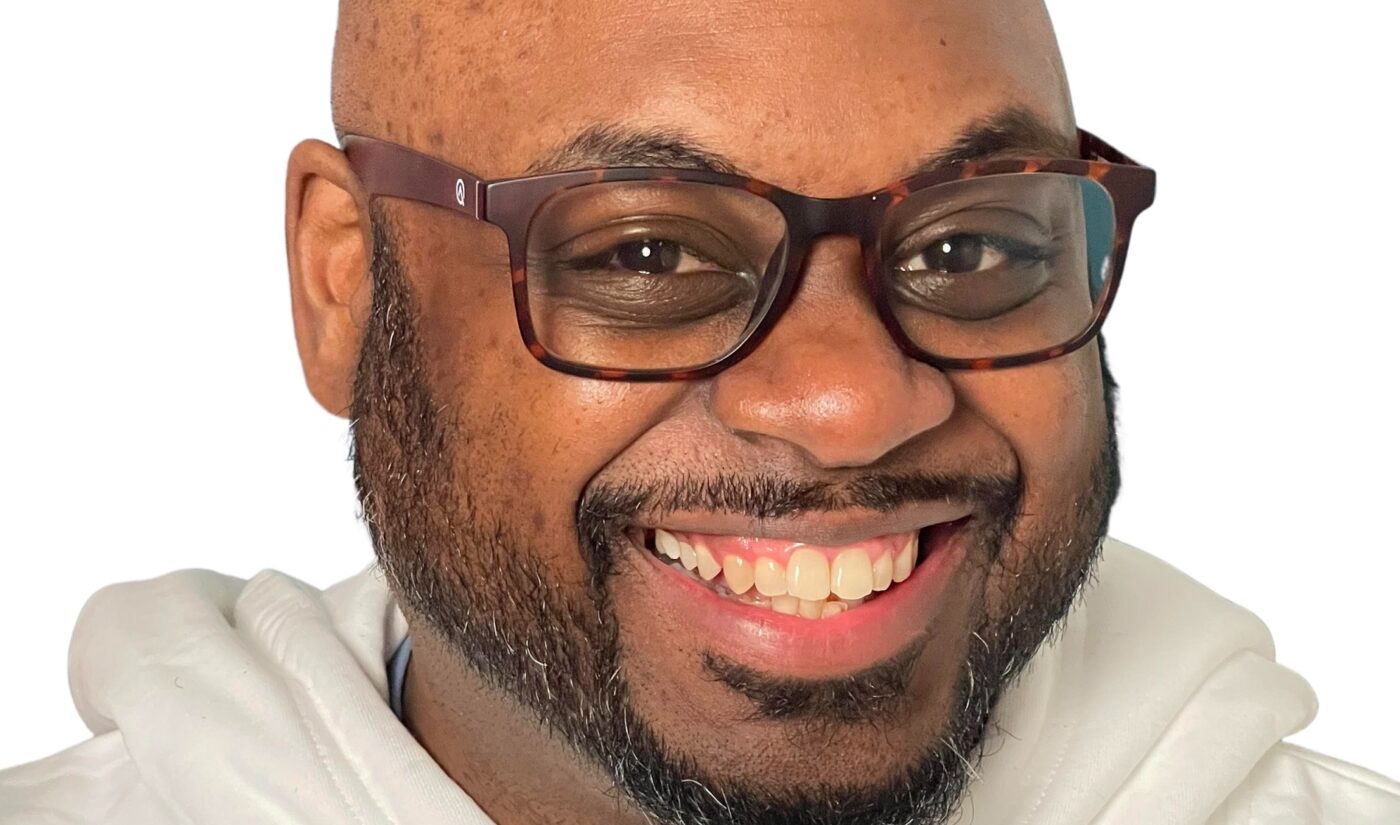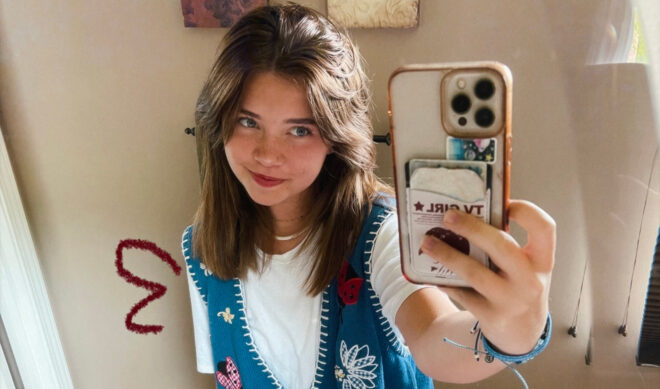Welcome to Streamers on the Rise, where we find streamers who are growing their channels, content, and audiences in extraordinary ways. Each week we’ll talk with a creator about what goes into livestreaming–both on and off camera.
Kahlief Adams has been in love with video games–and the video game industry–for as long as he can remember.
But he had a pivotal moment in 2021. Sitting in the dark of the crowd at The Game Awards, he watched Sting perform “What Could Have Been” from Arcane, the animated series based on League of Legends lore. It hit him that he was watching one of the most well-known musicians of all time, live, right in front of him. And around him, he says, both giving and receiving awards at the show, were the “best and brightest of all the folks in the world in terms of video gaming.”

Subscribe for daily Tubefilter Top Stories
But that wasn’t quite true, he realized.
“I’m not seeing a lot of Black and Brown folks onstage, I’m not seeing a lot of Black and Brown folks perform,” he says. “I came back from that, and I had been mulling this over.”
He thought about a quote from Shirley Chisholm, who was the first Black woman to be elected to the U.S. Congress: “If they don’t give you a seat at the table, bring a folding chair.”
Adams couldn’t stop thinking about it, and in 2022, he and co-host Riana Manuel-Peña introduced The Spawnies, a video game awards show with roots in Black and Brown hip-hop culture.
It wasn’t entirely new ground for Adams. He’s been running a podcast called Spawn On Me for ten years now, and that podcast is similarly dedicated to spotlighting gamers (and game developers) of color. Spawn On Me is how Adams caught our attention for Streamers on the Rise, because his show was an early adopter of video podcasting. For years, he has recorded his weekly episodes while livestreaming on Twitch, something he says is a way to “get that real-time interaction that feels good, and how do you also pay attention to the kind of bigger and main audience that’s in that space, and how do you meld them so that they actually feel like they are talking to each other and bringing each other value?”
Adams is gearing up right now to put on the third annual Spawnies, which is coming in February 2024.
Check out our chat with him below.
This interview has been edited for length and clarity.
Tubefilter: I’m very excited to get to talk to you–and very excited to speak to a fellow awards show runner.
Kahlief Adams: Yes. I’m like, we have to collab at some time. We got to figure something out. That’ll be rad.
Tubefilter: It’s definitely an interesting part of the business. I’d love to start with, give me a little bit of intro about you, where you’re from, and the cool stuff you did as a kid that led you to where you are now.
Kahlief Adams: Sure. My name is Kahlief Adams. I’m from the Boogie Down Bronx, originally back home in New York, now residing in Portland, Oregon. I run a video game podcast and now award show. I’ve been running the podcast called Spawn On Me for 10 years. We hit our 10th year in 2023. I’ve also been a host. I’ve been a person who has done consulting. I’ve done many, many things within the video game space, both with our show and outside of our show. It’s been a really interesting time.
I think the show started from a very specific and special place where I was in my nine-to-five job and not feeling very smart. I was doing the IT desk job thing, and it was sitting there and I was like, I really love what I do, but also I don’t feel like I’m using all of my brain. What are the things that I really want to dig into and things I care about? Video games have always been there, they’ve been there since I was three. The first game I ever got a chance to play was three, and now I’m 45. Now think about the years that have gone by in between that time and getting to see the growth of the video game space.
That was what got me into it, was seeing this technology kind of come out of nowhere that then moved into this new space and knowing that I had been a part of that language and part of that ethos for all of my lifetime and so many others, was what drove me to make a show around supporting and spotlighting people of color and wanting to see more folks like me in those spaces and thinking, I know the video games are a big business, I know that this is a thing that’s happening all over the world where are the folks who look like me who are making these things.
That was kind of the impetus for starting the show and then later on thinking about what an award show would look like from that perspective as well. It’s been an interesting run, it is been an interesting time in the space, and it has morphed and changed a lot, but it has been fantastic to be at the forefront of those conversations with our show that we’ve started a decade ago.
Tubefilter: Where did Twitch come into things?
Kahlief Adams: Twitch was a necessary evil in a lot of different ways. [laughs] The best way I describe it was podcasting in and of itself, at the time that we started to get into the pool, it was still very audio-based, and it wasn’t a thing where a lot of video podcasts had really popped up. Then we started to see Twitch become a thing. I’m old enough to remember when it was Justin.tv, seeing that this was now a new medium that people were really digging into, was the beginning of the upstarts like DrLupo and Ninja and other folks, and seeing that there wasn’t really a space for long-form conversation, it was mostly just about video game playing at that point.
We started to decide to move to a more video-facing format. We started originally doing stuff on YouTube, putting content on YouTube, but that firsthand contact and having that real-time interaction was something that we wanted to try to play around with and felt that Twitch was the perfect space to start that work. Twitch became a big part of our kind of landing space and a great place to be able to talk to people about, not only what they’re doing and showcase their games, but a great and better way to talk about the medium of podcasting and how you can elevate that as well. Twitch has been really paramount in getting us into that space, and it’s been really fun to play around in there.
Tubefilter: Do you record your episodes live on Twitch?
Kahlief Adams: We do. All the shows are live on Twitch.
Tubefilter: That’s so intimidating.
Kahlief Adams: It’s an interesting space because the thing that makes it really fun is the fact that it’s more about the technical parts for me than it is about the singular just chat-focused thing. We do something that’s very different and something I don’t think a lot of folks would actually recommend on Twitch, which is we don’t ignore chat, but we tell chat that we are going to talk to you in very specific parts of the show. That’s the thing that most, if not any Twitch streamer, will tell you, that’s the absolute most terrible thing to do and you should not do that. You should always have chat interaction. You should always be looking at and talking to chat.
At least I know that our biggest audience currently is still in audio formats. It winds up being a thing that if you’re listening to that show– I’m thinking about this in real-time all the time, is if you’re listening to our show and you hear me randomly talk or speak to someone else in chat, that needs to be purposeful and that needs to bring something into the conversation.
It shouldn’t be just me meandering and just hanging out and talking the chat just for the sake of it and being like, Look at that dope emoji that you put into the chat. There are things that translate over to video and audio podcasts in a way that don’t necessarily translate to Twitch, but there are parts of Twitch that absolutely enhance the experience for everybody involved.
I think that’s the happy medium that we’re trying to find and continuing to try to tweak is, how do you get that real-time interaction that feels good, and how do you also pay attention to the kind of bigger and main audience that’s in that space, and how do you meld them so that they actually feel like they are talking to each other and bringing each other value? I think also with the video layers of it, I get to play in spaces that I love too, which is I love video production. I love producing a show. That part of it every week is fantastic, because I get to do that literally every week. That part is fun.
Tubefilter: What does the average week of your life look like in terms of stuff you’re making, stuff you’re doing?
Kahlief Adams: That changes a lot because it goes from week to week. This week alone was sourcing guests, sourcing news material for the show, preparing the overlays and the parts that go into the actual, visual layers of the show, then doing my nine-to-five job, then preparing for our award show in February, talking to sponsors, figuring out contracts, also playing games. [laughs]
Tubefilter: Yes, playing games is a big one.
Kahlief Adams: Playing games for review and for personal pleasure, all of those things in a week. When I say that out loud, I’m like, oh yes, there are very few hours in the day where I’m not touching video games, where I’m not touching or involved with something that has to do with video games. It winds up taking up a fair amount of my week. Really, the easiest parts of my week are actually doing the show. That thing is tuned in pretty tightly at this point. From producing an hour or hour and a half show to producing and getting that out on all of our feeds, takes about 20 minutes at this point. How the minutiae works is much easier now than what it was when we were doing a three-hour show that wasn’t video or Twitch-based, but, it’s gotten a lot tighter in terms of that, and I’ve gotten better in terms of editing and all those kinds of things, so it makes all those things much, much easier to kind of get from point A to point B so that you can hear it every week.
Tubefilter: What’s your day job?
Kahlief Adams: Oh, right now I’m doing some social media consulting. I’ve worked in multiple places over the past couple of years. I’ve worked at Intel in their AR and VR department, I worked in at Amazon for a little bit, I worked at Riot Games and their diversity, inclusion, and equity department. I’ve worked in multiple places and at multiple studios at this point.
All of those stemmed from Spawn On Me. I wouldn’t have never gotten any of those jobs if Spawn On Me wasn’t a thing, and gave me a footing and a platform where people understood the work that I do and the value that I bring. It’s all that to say is like, if you’re thinking about what the potential transitions are for you, if you’re thinking about as a content creator, there are avenues there. If you build yourself up in certain spaces.
Tubefilter: Totally. What is your favorite game that you’ve played recently?
Kahlief Adams: Oh, I’m playing through Alan Wake right now.
Tubefilter: I’m hearing really good things about it. What else have you played recently that you liked?
Kahlief Adams: Alan Wake is great, the new Spider-Man 2 game is great. We reviewed that, which was super fine. That thing is fantastic and super good. I’m playing the new Mortal Kombat 1. Oh, a game that I think everyone should play, and I think if you don’t play it you’re doing yourself a disservice it’s El Paso, Elsewhere.
Tubefilter: El Paso, Elsewhere, okay.
Kahlief Adams: It’s a take on the old Max Payne games which is also a remedy game connected to The Control and Alan Wake Universe. It is one of the best games I’ve played this year from a team called, gosh, I just lost it, but go find that game, that game is good, that game is really good. The soundtrack on that game is like soundtrack of the year stuff for me.
Tubefilter: I’ll have to play it. Sorry, I got us a bit off track. Would love to hear how The Spawnies came about.
Kahlief Adams: Oh yes. The Spawnies is a really a fun story. I was sitting and watching The Game Awards, and I was physically at The Game Awards. It was during the year that Sting was a performer.
Tubefilter: Oh yes. For Arcane, right?
Kahlief Adams: Yeah, for Arcane, and then they had Imagine Dragons there, and it was super dope. I was like, okay, I’m sitting in this room with the best and brightest of all the folks in the world in terms of video gaming, and I’m not seeing a lot of Black and Brown folks onstage, I’m not seeing a lot of Black and Brown folks perform. I came back from that, and I had been mulling this over because again, it’s like one of those things of–We had a quote from Chisholm at the beginning of our show last year which said, “If you don’t have a seat at the table, bring your own chair.” I thought about that for a long period of time, thinking, and that’s always been in the back of my head of like, there’s going to be a space where you have to make your own stuff. If you want to see it in the world, you’re going to have to try to figure out a way to make it.
As much as I love The Game Awards and support the folks who make it, it doesn’t have soul. That’s the thing that I think is the biggest part and differentiator between what that show is and what the ethos and the foundation of Th Spawnies is. I wanted something that was going to talk to our culture and talk to, again, multiple cultures, but the basis is Black and Brown hip-hop culture. It is a part of that, that framework, that thread that brings us all together, which across everyone in entertainment that is a running throughline across all of it. I said, there has to be a way to do this in video game form, there has to be a way to showcase and spotlight people who are making the games.
Again, what Spawn On Me is trying to do is bring those people into the forefront and say, when you’re looking at the credits for the game that you just finished, you’re going to see a name that isn’t familiar or you wind up seeing someone in a space where you’re like, Oh, I wonder who those folks are who are doing that work. Let’s elevate those folks, let’s showcase those people, let’s give them a space to be able to not have 30 seconds to go take an award and win an award and go talk about what you do, and then get ushered off stage really quickly.
From a media and fun perspective, I want our show to be something where you get excited for it and it gives you a space to think about all those other cultural layers. Music is a big part of our show. We’ve had music acts in every year that we’ve done it. We have a really dope one for this year, and it winds up being that loop of, how do you entertain while also informing and also giving people their power? It’s a fun show that is unlike any other.
A lot of the motif is around me. We have these caricatures of me running around for most of the stuff, for most of the categories and things, and they’re not named the most default usual names for awards. Like our diversity award is called the Brookago Heritage Award. Brookago is the fictional place in which our show was born; my former co-host was in Chicago, I was in Brooklyn at the time, so you matched those two together and that’s where you get Brookago.
We have things like our most emotional game award, which is our “Snot Bubble Cry Award.” We have our VR Award which is our Jamiroquai Award. We haven’t gotten sued yet. I am waiting. We have things in that mix that are that are references to things that are within the culture, and some of them are little older references to memes that have happened in the space, but we wanted that to also feel different where that didn’t feel like you’re just getting your best shooter award for best adventure game award, because that’s also boring.
It’s all of those things sprinkled together that gives us what I think is one of the best video game award shows on the planet right now. We are doing something very different and we’re doing something very special. I think it’s bringing something to the table that no one has really done yet.
Tubefilter: Absolutely. You’re on your second year, third year?
Kahlief Adams: Third year. This will be year three this year.
Tubefilter: I know from behind the scenes of our stuff that it’s a hell of a lot of work. I can’t believe you put it together so quickly.
Kahlief Adams: The beauty of it is we don’t do it live yet. When that becomes a live show, then it’ll add–
Tubefilter: That’s a whole other animal.
Kahlief Adams: Yes adds a ton of complexity there.
Tubefilter: Are you thinking about that?
Kahlief Adams: It’s a plan, it’s a goal. I think in year five we might try to do a live show, but right now it’s trying to solidify all the things that you and I both know about. It’s like sponsorships, talent, getting those things together and finding a venue to do all that stuff. That’s been the hardest stuff this year has been. The gaming industry has pulled back a little bit on funding for certain things and it’s just harder to get certain things done. We’ll come across the finish line with a really good show that’s pretty comparable to what we did last year with a little bit of a tweak potentially. It gives us more space to play around with things and gives us the ability to run it a little bit late, you can produce it a little bit later.
I have to say this because one of the biggest parts of this also is, this is one of the first shows that’s been hosted by two Black folks. It’s me and Riana Manuel-Peña. It’s the first award show in the video game space that’s really been hosted by a Black woman in the space. That also to me is really important. Again it’s a space where Black women, I believe with my whole, heart run the internet. To have Riana with me, co-hosting this with me, and being a part of this process with me, has just been one of the best things on the planet, because it also showcases, again, the depth of our community.
She’s doing multiple things in multiple layers of the industry and will come on a show with me for an hour and instantly, immediately have all the information downloaded and understood and be able to pull that into that loving attitude that comes through whenever she’s on camera. All of those parts are another layer of what I think makes the show special and really dope.
Tubefilter: That creative partnership is invaluable.
Kahlief Adams: You need people who ride with you. If you think about it in the grand scheme, we’re going up against multiple juggernauts. We’re going up against The Game Awards, we’re going up against The Streamy Awards. When I say against, there’s no antagonism, but it’s like we’re all sharing space, right?
Tubefilter: No, we have to fight to the death.
Kahlief Adams: Yes, it’s going to be gladiators in the middle of the street. [laughs] It’s one of those things, we’re the super young upstarts when it comes to that. We’re the babies in the crew.
Tubefilter: You really are doing something different, though.
Kahlief Adams: Yes. I used to be really antagonistic towards the space in that way and be like, We have to be better than X. That has changed a lot where that framing was also not great for anyone involved. I believe in collaborative efforts, I believe that there’s no reason why The Streamy Awards and Spawn On Me couldn’t do something together, or we could be a part of The Game Awards or do some other stuff.
I feel like we could be able to do that stuff pretty easily because there are pockets that are missing from each particular show that we could fill, and we have a lane that is ours now. I think that is a thing that is really fun to be able to know, you can own a lane and be adjacent to other stuff and be next to it. Sometimes those things touch and sometimes they don’t. When they do, it’s wonderful, and when they don’t, you still have a thing to share.
It’s a learning process too of, how do you get your awards made? It’s all the super backend stuff that is really helpful to a lot of people to be like, “Where did you get your stuff done? Oh, that’s really nice material. How did you get that done?” Those conversations I would love to have with people, but it’s like, everyone is also heads down, getting the thing made.
Tubefilter: As you know, it’s a lot of work. Glad to see The Spawnies are doing so well. Any other cool plans or projects you’re working on?
Kahlief Adams: I do have a really fun project that’s going to be Spawn On Me. One of the things when Spawn On Me originally started, I come from the world of college radio, if you can’t hear it. One of the biggest things that I missed from that period was playing copywritten music in our show. I was doing it on the slide before I knew you can get sued for that stuff, but it’s a thing that I’ve wanted to go back to. We actually had a version of Spawn On Me that was on terrestrial radio here in Portland for about a year, which was awesome, because we were able to play music on our show.
Now we’re going to be doing something very similar to that, but we’re going to be doing that specifically on Spotify, which will be a lot of fun. It’ll be a little bit of a mix of what you’re used to me from my interview style, but it’ll be in another vein that will sometimes touch video games, but the idea that it doesn’t do that as much. It’ll be more of, let’s talk about a topic of the week, let’s talk about why you do what you do, let’s talk about the ethos of the human experience conversations. In this work, you don’t really get a chance to show your full self. A lot of people understand you in this lane that you occupy, but all of us have multiple likes of multiple things.
Again, I love sports, I love horror movies, likes of the depths of my soul, all of those things are things I care about and I never really get a chance to interview people about that stuff. This would be a chance to delve into some of those spaces. Excited for that. Hopefully, we can get that to launch next year, but lots of fun stuff in the works.
Tubefilter: Very cool. Anything else you want readers to know?
Kahlief Adams: Yes! The Spawnies 3 is coming in February of 2024. We’re pushing it out to Black History Month, which will be a lot of fun, so make sure you check that out. We’ll be on the front page of Twitch hanging out there and doing some work there. We’ll probably see if we can simulcast it, but I’m not going to say anything because they’ll be like, “I don’t know about that.” We’ll see what we can do. It’ll land in the end of February, ’24.












